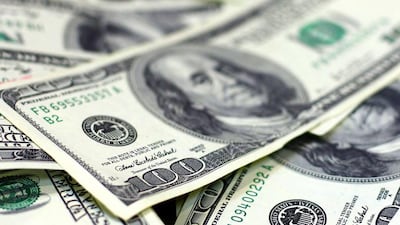The US dollar is expected to remain the dominant currency in world markets in the near future due to a lack of suitable substitute currencies, a top executive at Fitch Ratings said.
Although the euro and renminbi have both been cited as potential alternatives to the dollar as the default global currency, there are lingering questions about the long-term validity of the former, while the latter remains underdeveloped on global trading platforms, James McCormack, managing director and global head of Fitch Ratings' sovereign and supranational group, said.
"There is no obvious currency to displace the dollar and it still seems to be the currency of choice for countries and companies in emerging markets who want to borrow externally. It is also the currency of choice for central banks investing in foreign exchange reserves and the currency of choice for linked exchange rates," Mr McCormack told The National on the sidelines of the Alternative Investment Management Summit in Dubai.
“Renmbini, it is not an open capital account and it is difficult for some investors to get money in and money out of China. Yen (Japanese currency) has a certain role in reserve currency status and maybe it reached peak of that role,” he said.
As much as 70 per cent of all dollars are held outside the United States, according to a Reuters report citing a research paper by the US Federal Reserve. It said roughly half the $1.6 trillion (Dh5.9tn) of dollar banknotes in circulation were outside the United States, making it the dominant currency globally.
Mr McCormack said there is potential for a digital currency to replace the dollar but this is a longer term prospect due to issues of “discomfort” with digital coins, as well as the technology involved in them.
“I think we are probably some distance from that idea having a meaningful traction because some people are not comfortable with the concept and don’t fully understand it but over time maybe the global financial system can move in that direction.”
The Bank of England's governor, Mark Carney, called for a global electronic currency to be created to dampen the domineering influence of the US dollar on global trade earlier this year.
In a speech at an annual gathering of central bankers at Jackson Hole in the US in August, Mr Carney said a global electronic currency could act as “synthetic hegemonic currency … perhaps through a network of central bank digital currencies”.
On US-China trade tensions, Mr McCormack said these were likely to last for some time, despite recent positive developments.
“We don’t anticipate much change at all. Maybe we are going to have a phase one agreement but it is not clear what that agreement would be and it is not clear whether there will be just phase one or will there be phase two, phase three as well.”
He also said the global economy will slow this year and next due to current trade tensions but ruled out the possibility of a recession.
The Chinese economy is expected to grow less than 6 per cent next year and “there is no reason to be overtly concerned about the US economy,” he said.
Last month, the International Monetary Fund reduced its outlook for global growth for this year downward for the fifth time, citing a rise in protectionist policies and heightened uncertainty around trade and geopolitics.
It said global economic growth will slow to 3 per cent this year, the slowest rate since the onset of the 2008 global financial crisis, before picking up to 3.4 per cent next year.


